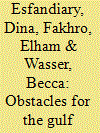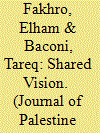| Srl | Item |
| 1 |
ID:
107378


|
|
|
|
|
| Publication |
2011.
|
| Summary/Abstract |
Judging by their official statements, the establishment of a zone free of weapons of mass destruction (WMD) in the Middle East ranks high on the list of policy priorities of the six member states of the Gulf Cooperation Council (GCC)-Bahrain, Kuwait, Oman, Qatar, Saudi Arabia, and the United Arab Emirates (UAE).[1] As countries bordering a once-proliferating, aggressive state (Iraq); facing another suspected of seeking a nuclear weapons capability and bent on regional hegemony (Iran); and living in the vicinity of nuclear powers outside the nuclear Nonproliferation Treaty (NPT) regime (India, Israel, and Pakistan), they arguably have a paramount security interest in its rapid formation.
|
|
|
|
|
|
|
|
|
|
|
|
|
|
|
|
| 2 |
ID:
187772


|
|
|
|
|
| Summary/Abstract |
This essay provides an overview of the growing convergence of interests between Israel, the United Arab Emirates, and Bahrain, the joint signatories to the 2020 Abraham Accords. It argues that the two Gulf states increasingly view Israel as an attractive model to emulate in terms of the management of internal dissent and external security. It details how both sides are seeking to develop a joint regional security architecture that mitigates their shared concerns around a possible return by the United States to the 2015 Iran nuclear deal (Joint Comprehensive Plan of Action or JCPOA), as well as the Gulf states’ specific anxiety about a broader US drawdown in the region. The analysis highlights how this new framework built around a common securitized approach is also intended to further the objectives of the two Gulf monarchies to lead the course of regional affairs.
|
|
|
|
|
|
|
|
|
|
|
|
|
|
|
|